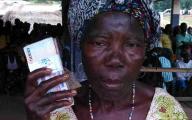
Supporting Vulnerable Households Recover from the Ebola Crisis
Request for Proposal
ACDI/VOCA is seeking expressions of interest from external evaluator(s) to design and carry out a final end–of-project summative performance evaluation for the Emergency Food Security Program (EFSP) implemented for post-Ebola recovery in Sierra Leone between April 10, 2015 and December 31, 2017. The successful bidder will conduct a final evaluation of ACDI/VOCA’s SNAP Plus project in Sierra Leone that consists of two components to determine to what extent the program, particularly cash transfers, contributed to recovery of household food security and fostered resilience against future shocks from similar emergencies that impact social and economic development.
Summary
In early 2014, Sierra Leone confirmed its first cases of Ebola virus disease, which eventually spread to the Kailahun, Bombali, Tonkolili, and Koinadugu districts, where ACDI/VOCA had been implementing USAID’s Office Food for Peace-funded Sustainable Nutrition and Agriculture Promotion (SNAP) program since June 2010. When the situation escalated into a crisis, the government of Sierra Leone implemented restrictions on public gatherings and closed schools in the Kailahun district in June 2014, declaring a state of emergency.
To address the economic and social impacts of Ebola in Sierra Leone, USAID’s Office of Food for Peace awarded funding for ACDI/VOCA’s Sustainable Nutrition and Agriculture Promotion Plus (SNAP+) program in April 2015. Designed as an Ebola response and recovery program, a key component involved direct, unconditional cash transfers to Ebola-affected households. The SNAP+ program also included activities designed to complement ACDI/VOCA’s preexisting Title II SNAP program.
After ACDI/VOCA’s much larger development program, SNAP, came to an end in December 2016, the SNAP+ project was renamed the Emergency Food Security Program (EFSP) to avoid confusion.
Objectives
EFSP supports vulnerable households as they recover from economic shocks resulting from the Ebola crisis by doing the following:
- Reducing negative coping strategies by ensuring that vulnerable households can access food available in local markets and provide children at risk of malnutrition with locally produced food supplements to boost protein and nutrient intake
- Increasing agricultural production and food security at the community level to support early recovery through access to production inputs, technical assistance, and stable prices in local markets
- Assisting agribusiness enterprises to overcome financial shocks caused by Ebola, so they can resume provision of agricultural inputs and access to markets
Activities and Approaches
- Cash Transfers: In collaboration with government institutions, partner NGOs, and local community structures, ACDI/VOCA implements a cash transfer program targeting extremely poor households in the Kailahun, Bombali, Tonkolili, and Koinadugu districts that have been affected by the Ebola crisis.
- Food Supplements: Children between two and 59 months identified with or at high risk of moderate acute malnutrition (MAM) are screened and provided with Sierra Mix, a locally manufactured nutritional supplement.
- Food Production: Expand agricultural production by supporting farmers in the 2015 planting season with small packages of inputs and production training.
- Jump Start Grants: The program offers recovery grants to small agribusiness enterprises heavily impacted by Ebola, so that they can resume providing inputs and other services to producers and other key actors within key agricultural value chains.
Achieved Project Results
- Cash transfers to 124,220 beneficiaries were successfully completed across all three targeted districts. In addition, SNAP+ was instrumental in developing and cochairing a cash transfer working group, enabling organizations and donors to coordinate efforts and harmonize approaches.
- 1,225 children with or at high risk of MAM were provided with remaining stocks of SNAP Title II food commodities, and additional screening is ongoing to provide them with Sierra Mix, a locally made nutrient supplement.
- Farming groups formed under the Government of Sierra Leone’s Smallholder Commercialization program were assessed and 285 of them consisting of approximately 23,800 farmers received seed packages through a voucher program to re-start stalled production.
- An Agribusiness Enterprise and Small and Medium Enterprise (SME) jump start grant program has been developed with applicant finalization in progress and implementation scheduled to start.
- The long-term sustainability of recovery relies on beneficiaries being able to remain out of debt and maintain economic activities that provide for household needs. 9,600 beneficiaries will be served through project supported village savings and loan associations (VSLAs).
ACDI/VOCA also has a relationship with PICS in Kenya, through its AflaSTOP program, which has a major focus testing the efficacy of hermetic storage (including PICS bags) to arrest the growth of aflatoxin in maize. As part of this, AflaSTOP conducted the largest trial to date of small-scale agricultural grain storage devices, a multi-year effort, the results of which are summarized at a high level in this graphic and will soon be submitted for a scientific journal publication. AflaSTOP has also supported the local distributor of PICS in Kenya to address some supply chain and marketing issues to improve the availability of those bags in rural areas.
Learn more about AflaSTOP’s research into hermetic storage and aflatoxin.
Funder: USAID
Contact: Kelsey Pridemore, KPridemore@acdivoca.org


